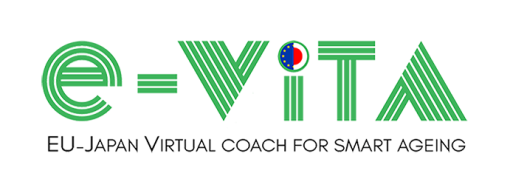

Population ageing is one of the most pressing societal issues of the 21st century. Life expectancy has increased rapidly over the last century due to improved living standards, better healthcare, medical progress and increased awareness of health issues. Despite a drop in life expectancy caused by COVID-19, life expectancy at birth is still at 83,2 years for women and 77,5 years for men in the European Union (Eurostat) and 87,57 years for women and 81,47 years for men (Japanese Ministry of Health, Labor and Welfare). In this context, new conceptual solutions for prevention and health promotion are needed by using intelligent technology to support older adults in healthy and active ageing.
The e-VITA virtual coach provides a solution built on socio-technological excellence of "Made in Europe" and the excellence of technology "Made in Japan", by combining the most advanced partners and expertise from both areas, and by following the concepts from Society 5.0 (Japan) and Digital Europe (EU). The e-VITA virtual coach will provide personalized recommendations and interventions to older people, for sustainable well-being in a smart living environment at home, through different technologies.
In a first step, research centers, IT companies and universities in Europe and Japan developed the interactions with the users, specifically the so-called Natural Language Processing (NLP). The challenge was to make technologies directly interact with older adults through the voice, listening and answering to requests.
Then and for the first time in research, technologies of the e-VITA coaching system such as Gatebox, OuraRing, NeU and chatbots were tested for 2 to 7 weeks by 36 older adults in Japan, Germany, France and Italy in their private homes.
The older people show that:
What’s next?
Based on the feedback from older people, the e-VITA coaching system will be adapted to be more of a conversational companion that can be switched on and off. The adapted e-VITA virtual coaching system will then be tested in 2023 with 180 people.
The project has received funding from the European Union Horizon 2020 Programme under grant agreement no. 101016453. The Japanese consortium received funding from the Japanese Ministry of Internal Affairs and Communication (MIC), Grant no. JPJ000595.